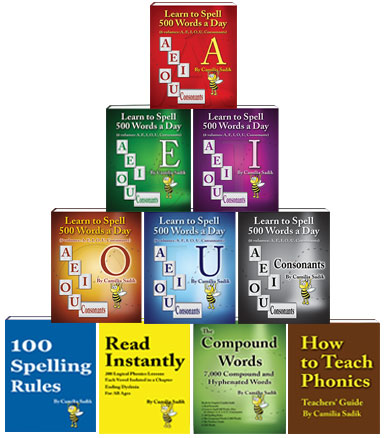Phonics, Spelling and Dyslexia are Linked
Dyslexia in Spelling Ends! Guaranteed!
Phonics Inconsistency → Poor Spelling → Dyslexia
1. Phonics vs. Plain Letters
Not All Languages have Dyslexia: Most known languages have a consistent same letter or same symbol to represent a single sound, every time that sound is written in words. Such languages might have only a single letter like the “k” to represent this sound every time the sound of “k” is written, as in kite, cat, character, frequently, and maximum. Such languages do not have dyslexia in spelling and do not have the need for remedial reading programs or special education departments in their schools or community colleges.
2. How Phonics, Spelling and Dyslexia are Linked
Lack of Logic → Poor Spelling among Logical Learners: The inconsistency in the way we spell phonics in words causes spelling difficulties among logical learners. The learning style of logical learners is a logical learning style; they need logic to decide whether to spell a same sound, one-way and not the other. Without logic, they cannot memorize whether to spell a “w” sound as in “suite” with a “u” or a “u.” Lack of logic causes logical learners to have spelling difficulties, and eventually they end up falling behind in class.
Poor Spelling + Forced Speed-reading → Dyslexia: After they fall behind in class, kids who cannot spell feel pressured to read in a hurry to catch up with their classmates. They are forced to speed-read before learning to read or spell words. In their haste, they see letters in reverse and then spell letters in reverse, in that same manner that they saw them and read them.
3. Logical Learning Style vs. Memorizing without Logic
Logical Learning Style: Those who have a logical learning style cannot memorize anything that does not make sense; they can only memorize after seeing the logic behind what they are about to memorize. Hence, they can memorize the spelling of English words only after seeing logical explanations or spelling rules.
High Illiteracy Rate among Logical Learner: According to reliable statistics, most of us have a severe or mild case of illiteracy in English. Some of us can read and comprehend, but cannot spell most of the words that we read; others cannot read at all, or read below their grade level. Typically, logical learners can get by and pass in schools because their teachers can understand what the words mean when spelled with plain letters. Logical learners may spell like this and be understood, “We uzed to meat hear every weak.”
Memorizers: English words were written for those who were born with a different wiring in their brains, which I call memorizers. Memorizers are those who can look at words and memorize their spelling, without questioning the logic in the way sounds are spelled in words.
4. Teaching Phonics First vs. Whole Language
5. Spelling Difficulties and Dyslexia
6. Remedial Reading Programs
7. Phonics Approach
8. Lee Learned to Read in a Week!
10 Phonics and Spelling Books or E-books


